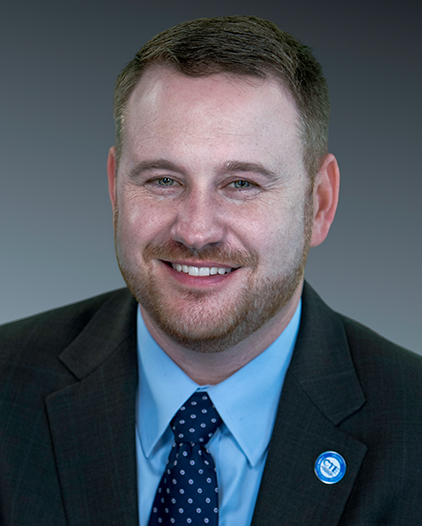 Advance CTE joins the Arkansas Department of Education in welcoming Ross White as the new State Career Technical Education (CTE) Director. Ross transitions into this role while fulfilling the duties of the Association for Career and Technical Education (ACTE)’s Region IV Vice President.
Advance CTE joins the Arkansas Department of Education in welcoming Ross White as the new State Career Technical Education (CTE) Director. Ross transitions into this role while fulfilling the duties of the Association for Career and Technical Education (ACTE)’s Region IV Vice President.
Advance CTE staff met with Ross as he shared his pathway to becoming the State CTE Director, as well as his initial priorities for CTE in Arkansas.
Advance CTE: Which of your professional experiences has most prepared you for your role as the State Director?
Ross: Most of my time in education has been spent in the CTE setting: a classroom educator, career student technical organization (CTSO) advisor, district CTE director, and as an ACTE officer and member. I give credit to my years as the district director because it is in this role where I learned how to be innovative and bold, rethinking systemic solutions to serve each learner. I also developed strong business and industry partnerships that I can continue to foster as State Director.
Advance CTE: In what ways have you had the opportunity to leverage social capital and professional networks in your career progression?
Ross: Early in my professional career journey, I had a mentor who taught me all I needed to know about CTE. I have relied immensely on this knowledge throughout my career, and will do so as I became the State Director. I also participated in the ACTE’s National Fellowship and have been active in multiple professional memberships. In my experience, no matter the type of fellowship (or mentorship), there will be an amount of influence, conversation and ability to impact change. Ultimately, social capital is not the people you know, but the people who make you grow.
Advance CTE: What excites you most about being the State Director in Arkansas?
Ross: It excites me that in this new role as State Director I will be able to more quickly connect policy and programming across the CTE ecosystem in the state. This is largely due to my background in school administration, in the classroom and at the state agency. However, also playing a part is the consolidation of all education programs under the Department of Education. Being under one “roof”, the state CTE system will become much stronger in our cross-sector relationships, aligning secondary and postsecondary systems, and will have the opportunity for more frequent communication and data sharing.
Advance CTE: As you are settling into your new position, what initial priorities have you identified?
Ross: I have identified a few initial priorities around CTE data collection and reporting. One of our Strengthening Career and Technical Education for the 21st Century Act (Perkins V) program quality indicators is credentials of value. Yet, we do not have a best practice in place to meet the data reporting needs for credentials in our state. Once we identify the best path forward from the state-level, the next priority will be to educate local districts on credentialing and credential data.
The work we have to do around credentialing aligns with our career coach initiative in the state. We have received additional funding to implement career coaches and it is a priority to scale statewide.
Advance CTE: Fast forward and we are now celebrating your one-year anniversary as State Director. What is one challenge you’d like to have overcome by that milestone?
Ross: We have a need for the division of career and technical education (DCTE) to reinvent our brand in the state. We are known far too often as, “the rules place.” I want to build more trusting and lasting relationships with our local recipients, ensuring they know who to call on my state team when they are in need of support. I hope to have been successful in this endeavor by this time next year.
Our state team will also work to address teacher shortages across the state. I am sitting in on a working group that is developing a grow your own program. Over the next year, I hope to be able to celebrate its success.
Advance CTE: What is one weekend activity or hobby or interest you would like your peers to know about you?
Ross: Outside of work, my wife and I spend much time attending to our daughters and their love for dancing, swimming and gymnastics.
Welcome, Ross! Advance CTE is thrilled to support Ross as he strives to ensure each learner in Arkansas has access to and the means to succeed in any high-quality CTE program or experience that leads to success in their career of choice.
Click here to learn more about the state CTE system in Arkansas.
View resources that feature best practices in Arkansas here.
Follow Ross on Twitter
Brittany Cannady, Senior Associate for Digital Media


 Lawmakers Continue to Negotiate FY22 Spending Bill
Lawmakers Continue to Negotiate FY22 Spending Bill “Go forth without limits!” was an apt parting chat message as over 70 state Career Technical Education (CTE) leaders from across 16 states convened virtually last month to launch the community of practice for
“Go forth without limits!” was an apt parting chat message as over 70 state Career Technical Education (CTE) leaders from across 16 states convened virtually last month to launch the community of practice for 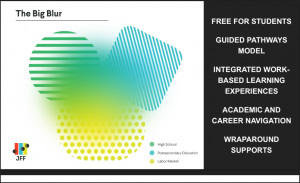 Vargas challenged attendees to dream big and be the new models for scalable solutions by being a “network facilitator,” by combining career pathway expansion with intentional investments in collaboration and sustained partnershi
Vargas challenged attendees to dream big and be the new models for scalable solutions by being a “network facilitator,” by combining career pathway expansion with intentional investments in collaboration and sustained partnershi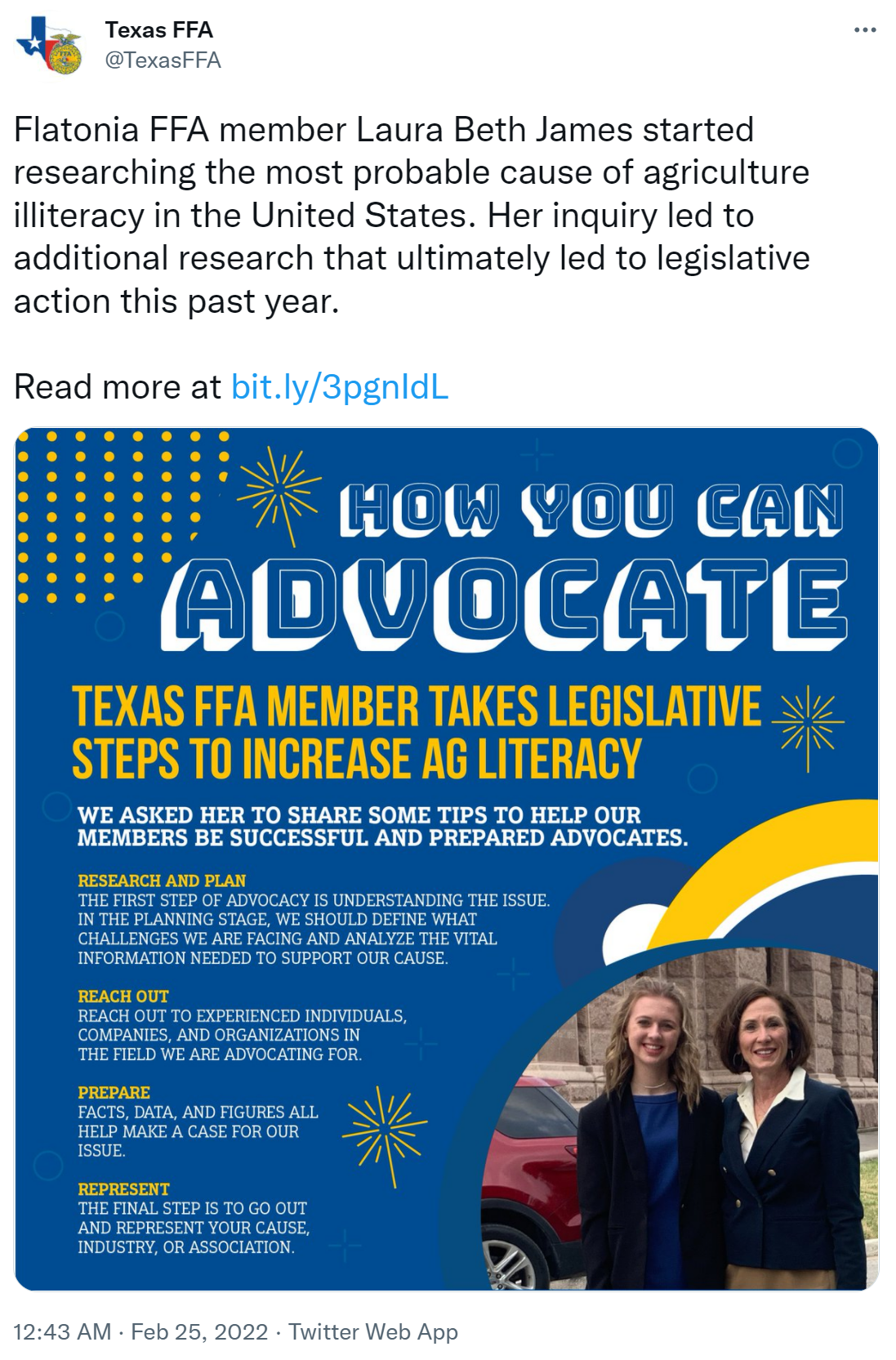 Laura Beth from Texas FFA noticed a barrier to each learner reaching their full potential within their career journey. Her commitment to
Laura Beth from Texas FFA noticed a barrier to each learner reaching their full potential within their career journey. Her commitment to 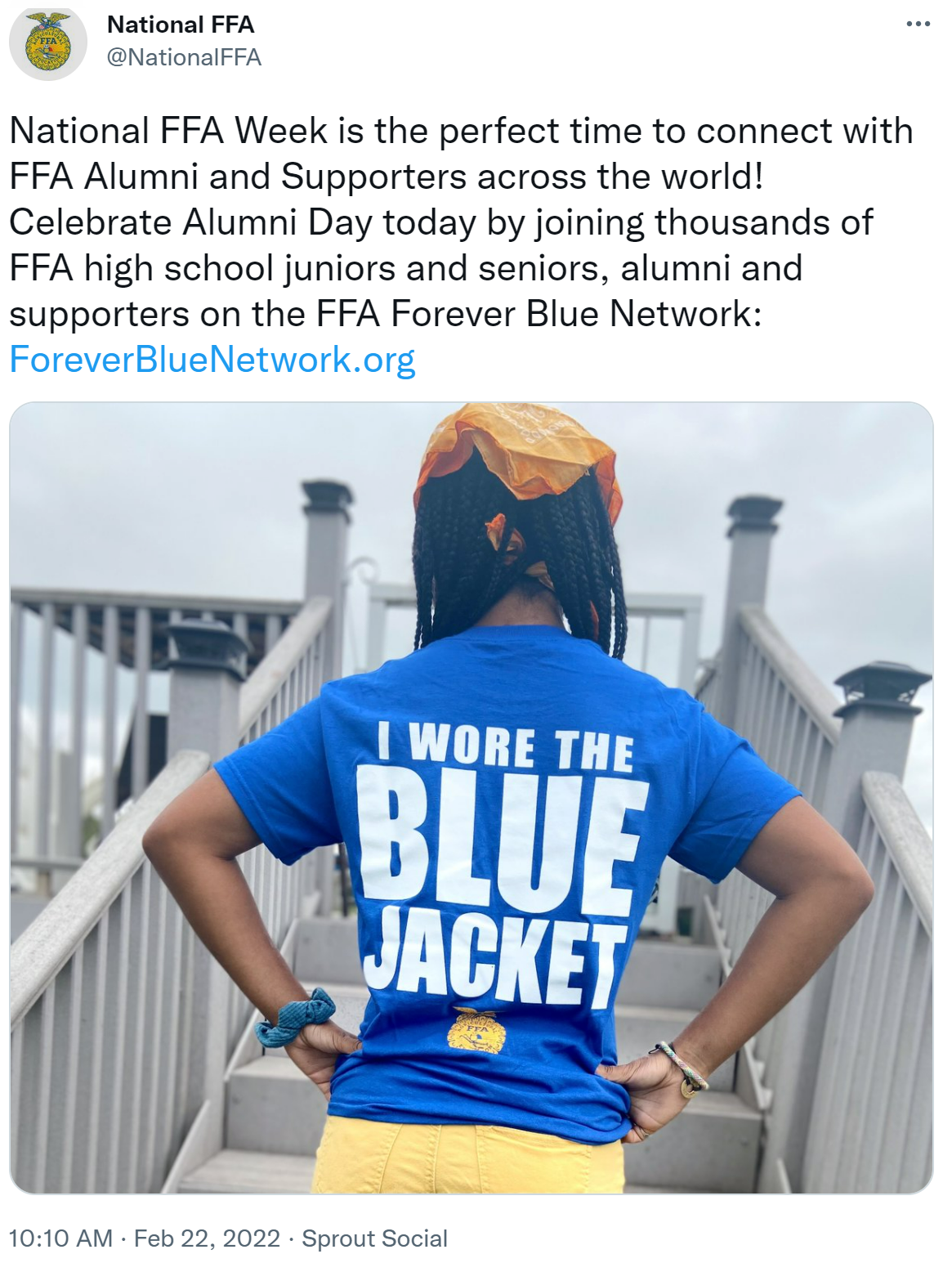
 On Give FFA Day 2022, corporate donors from industry showed their value in the skills learners receive when participating in FFA. Donors participated in donation matching challenges throughout the day to support the CTSO and ultimately the learners served.
On Give FFA Day 2022, corporate donors from industry showed their value in the skills learners receive when participating in FFA. Donors participated in donation matching challenges throughout the day to support the CTSO and ultimately the learners served. 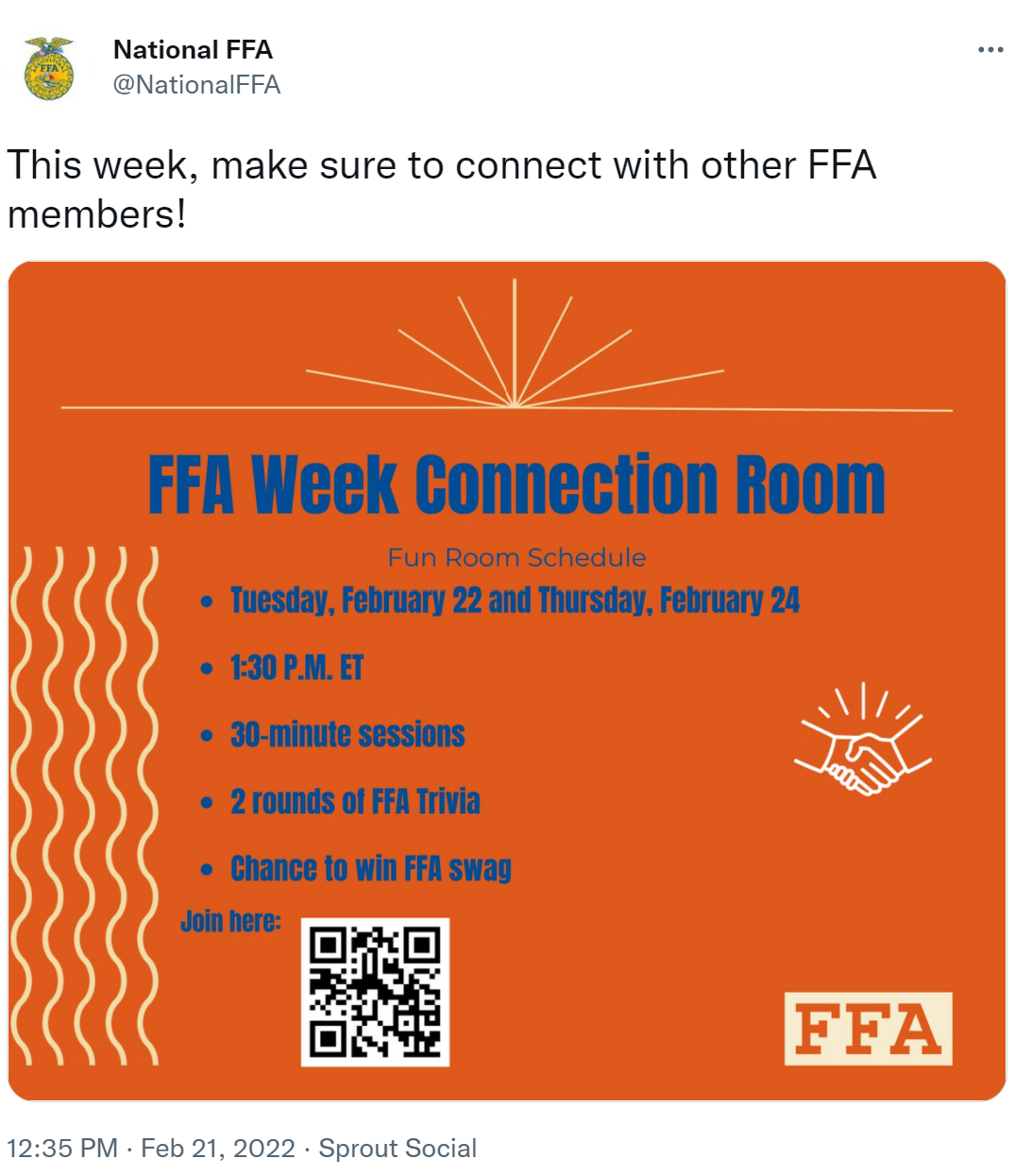 Future dates for National FFA Week are below:
Future dates for National FFA Week are below: These organizations are a powerful model for learner-centered and learner-led education, and Advance CTE is pleased to be joined by seven national CTSOs in supporting the national vision for CTE.
These organizations are a powerful model for learner-centered and learner-led education, and Advance CTE is pleased to be joined by seven national CTSOs in supporting the national vision for CTE. 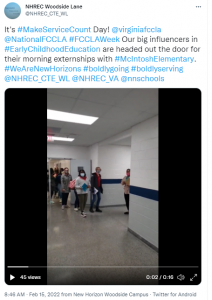 FCCLA members at New Horizons Regional Education Center: Woodside Lane in Newport News,
FCCLA members at New Horizons Regional Education Center: Woodside Lane in Newport News,  Griffin Middle School in
Griffin Middle School in 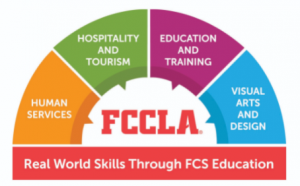 FCCLA strives for FCCLA members to have clear paths for their skills to be valued and counted. FCCLA has identified four career pathways that align to key technical and “employability” skills gained through FCCLA experiences, listed below. Members also have the opportunities to test and display skill competencies at
FCCLA strives for FCCLA members to have clear paths for their skills to be valued and counted. FCCLA has identified four career pathways that align to key technical and “employability” skills gained through FCCLA experiences, listed below. Members also have the opportunities to test and display skill competencies at 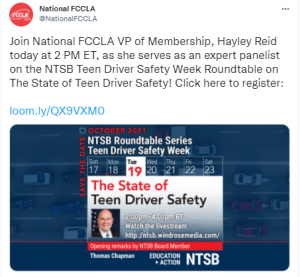 FCCLA members have the opportunity to share their skills and make connections beyond the classroom and even their state. National FCCLA leader Hayley Reid participated in a federal policy panel held by the National Transportation Safety Board.
FCCLA members have the opportunity to share their skills and make connections beyond the classroom and even their state. National FCCLA leader Hayley Reid participated in a federal policy panel held by the National Transportation Safety Board. 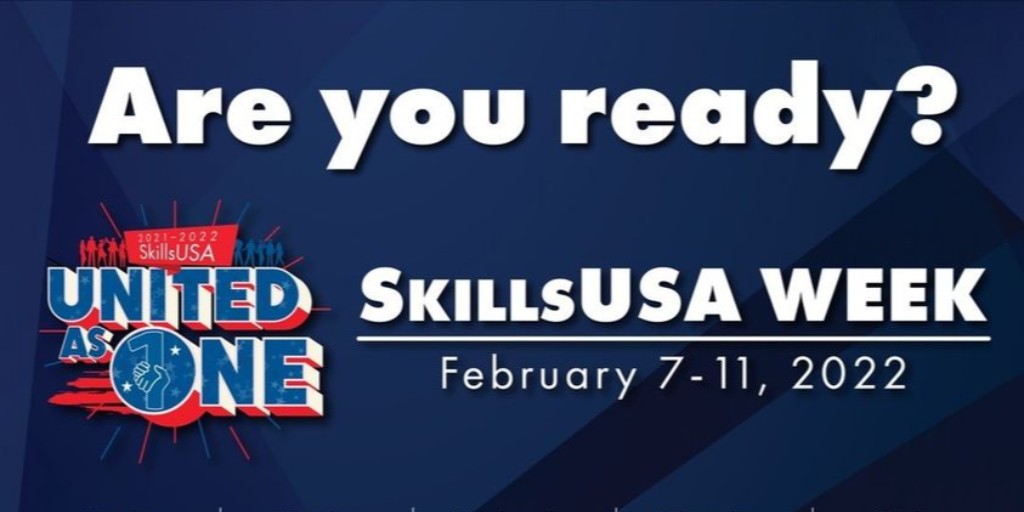 Throughout February, the
Throughout February, the 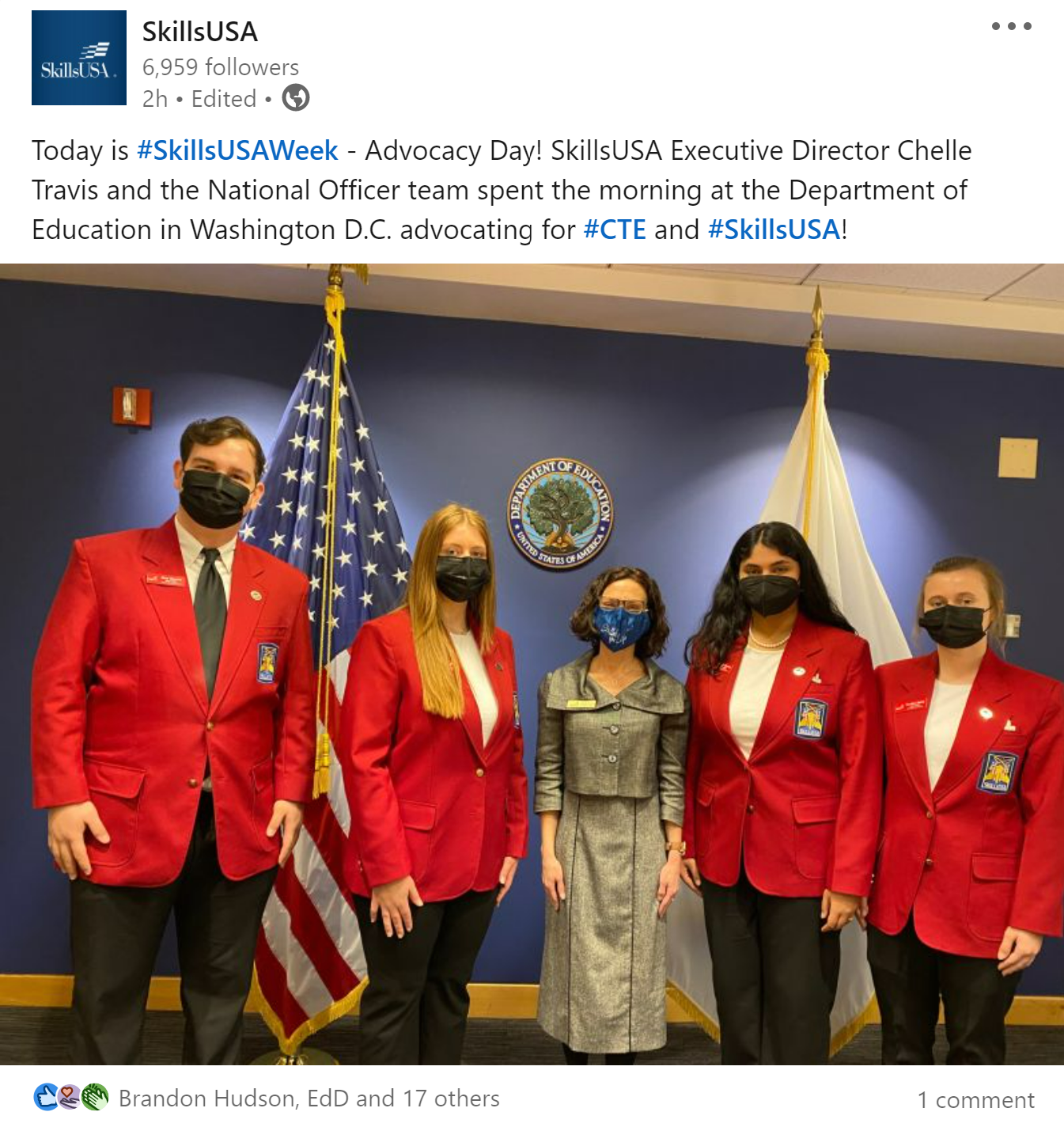 On Recognition Day, SkillsUSA took to social media to recognize and honor members, advisors, administrators, business partners, community leaders and supporters who are impactful in the career preparation ecosystem and within their local SkillsUSA chapters. Honorees were presented with a SkillsUSA Certificate of Appreciation.
On Recognition Day, SkillsUSA took to social media to recognize and honor members, advisors, administrators, business partners, community leaders and supporters who are impactful in the career preparation ecosystem and within their local SkillsUSA chapters. Honorees were presented with a SkillsUSA Certificate of Appreciation.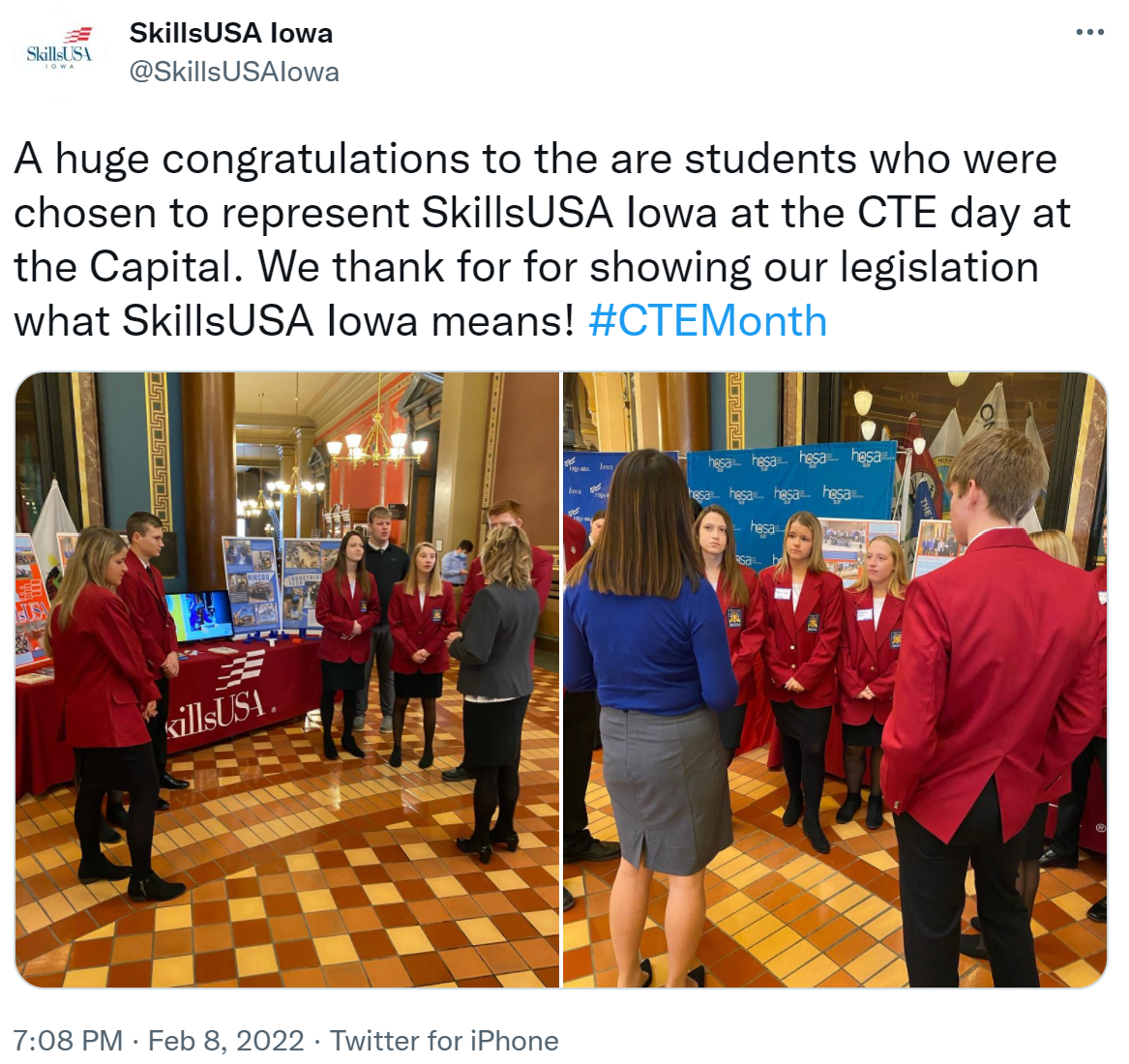 Complementing national advocacy efforts by the CTSO, many SkillsUSA state associations hosted their own CTE Days on Capitol Hill, as seen by SkillsUSA Iowa.
Complementing national advocacy efforts by the CTSO, many SkillsUSA state associations hosted their own CTE Days on Capitol Hill, as seen by SkillsUSA Iowa.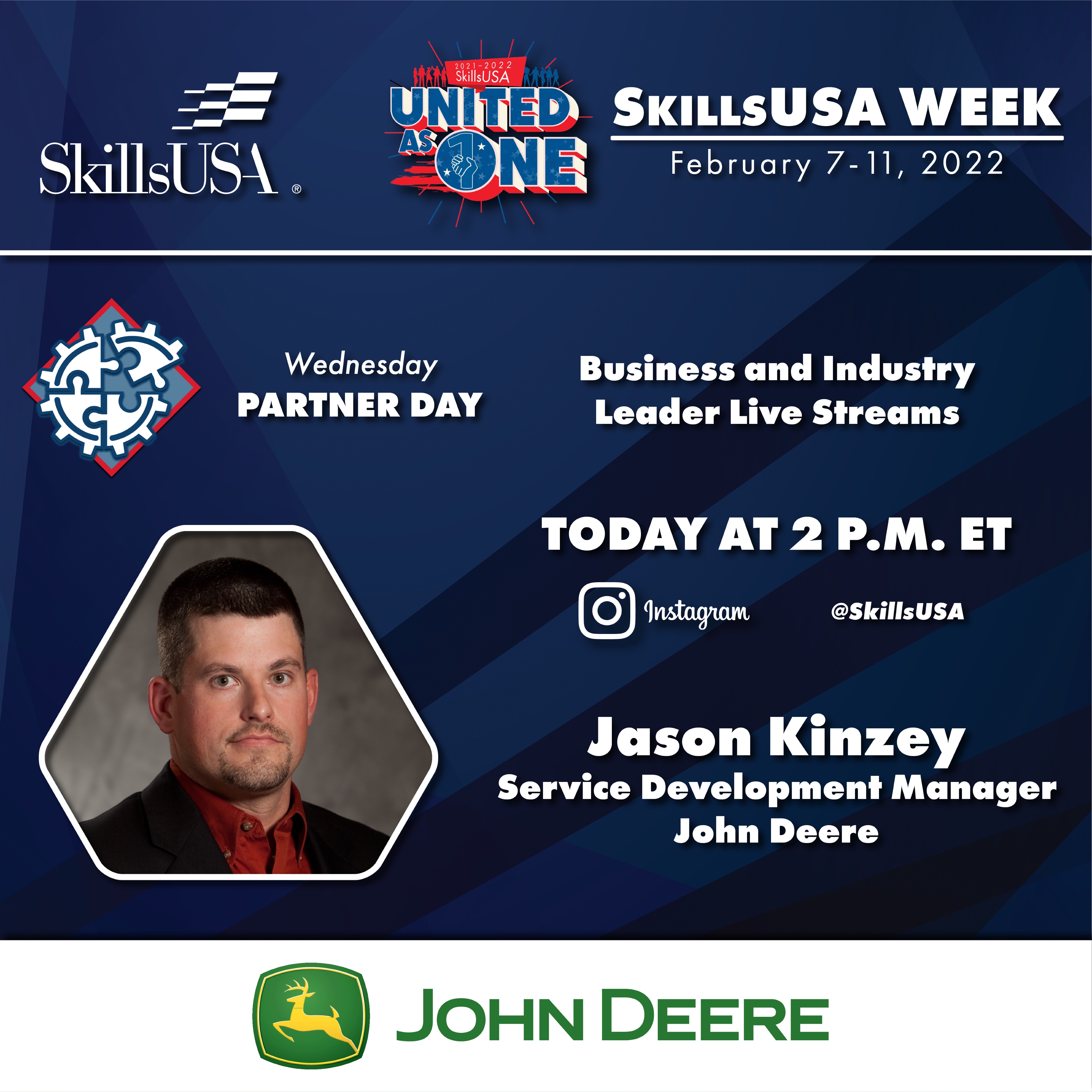 On Partner Day, National SkillsUSA asked state associations and local chapters to connect with partners in their communities. National SkillsUSA hosted a live interactive session for CTSO members to engage with business and industry leaders. Learners were able to hear what it means to be workforce ready and which skills are valued by employers that ultimately lead to career success in their respective industries.
On Partner Day, National SkillsUSA asked state associations and local chapters to connect with partners in their communities. National SkillsUSA hosted a live interactive session for CTSO members to engage with business and industry leaders. Learners were able to hear what it means to be workforce ready and which skills are valued by employers that ultimately lead to career success in their respective industries. 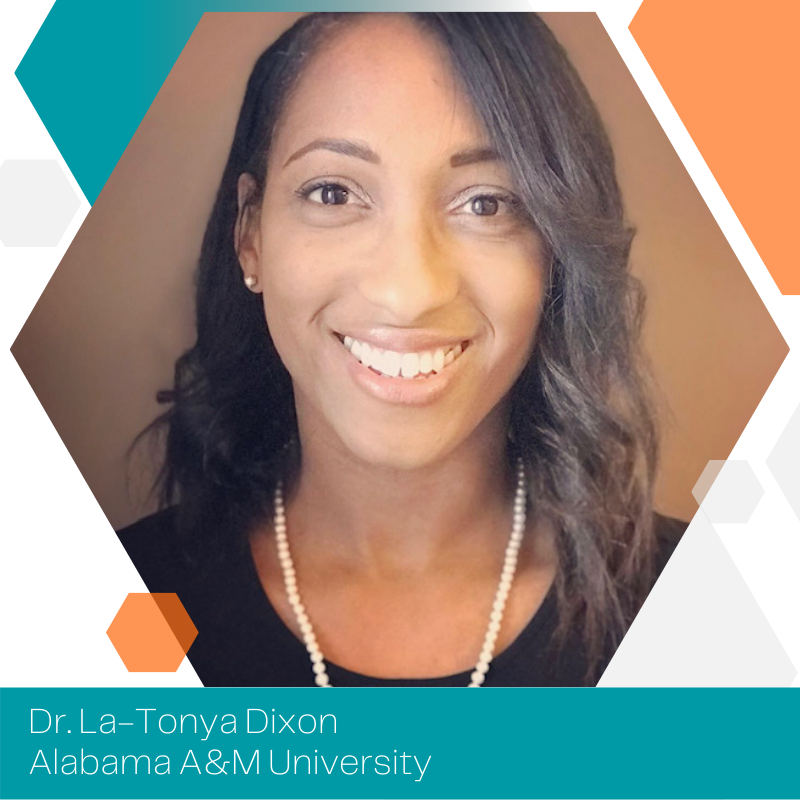
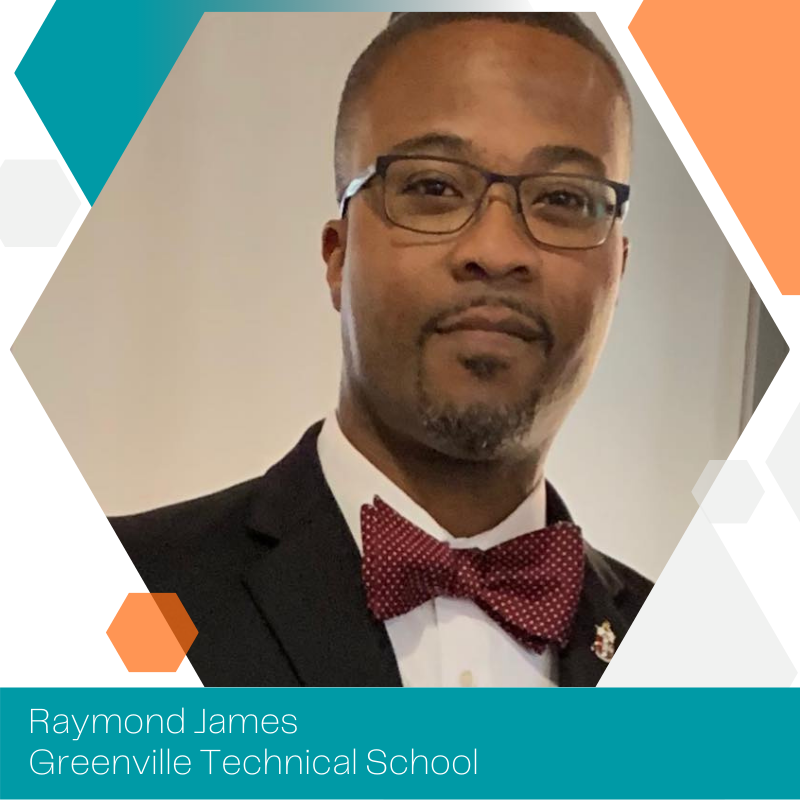 Raymond James (South Carolina) is a veteran of the United States Army, and currently serves as Department Head for machine learning at Greenville Technical School in Greenville, South Carolina. James earned an associate degree in General Engineering Technology at Tri-County Technical College and a bachelor’s degree in Business Administration from Kaplan University.
Raymond James (South Carolina) is a veteran of the United States Army, and currently serves as Department Head for machine learning at Greenville Technical School in Greenville, South Carolina. James earned an associate degree in General Engineering Technology at Tri-County Technical College and a bachelor’s degree in Business Administration from Kaplan University.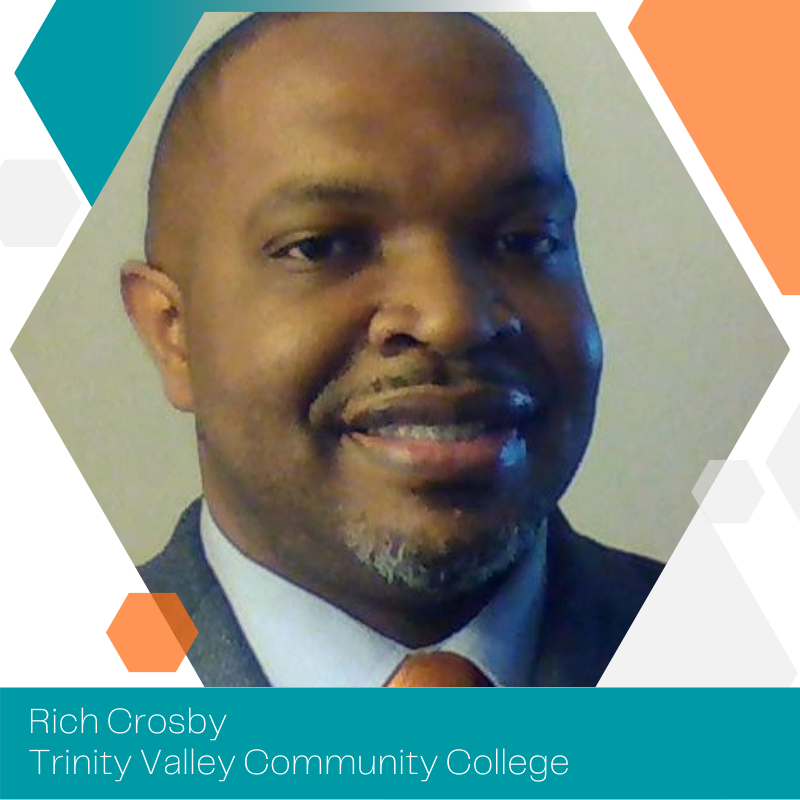
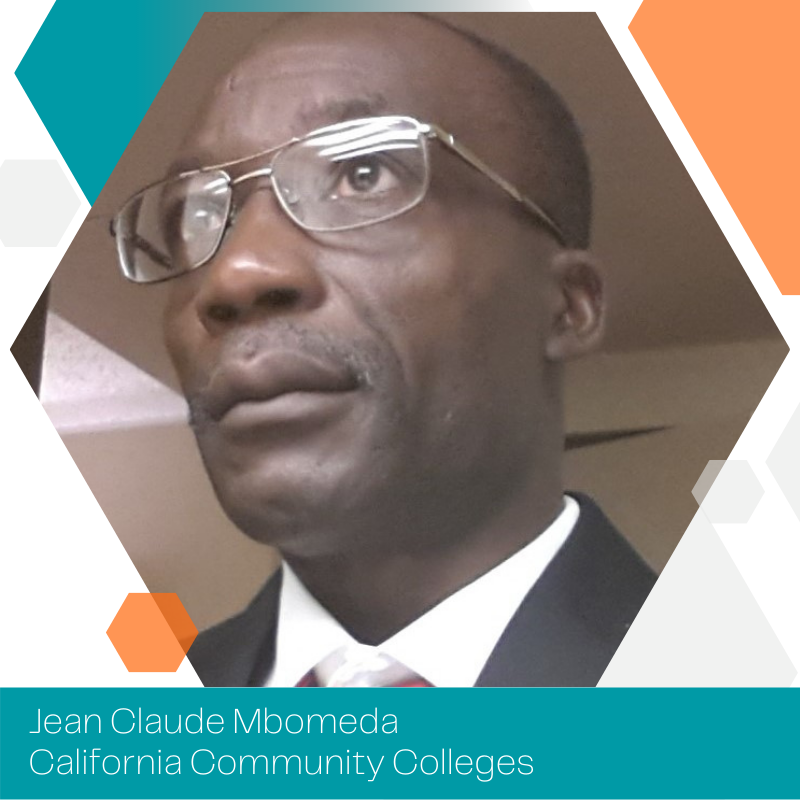
 Justin Chin (Oregon) has two decades of experience in education as an instructor and student and career support specialist at the secondary and postsecondary level, and currently serves as Director of High School Connections at Lane Community College in Eugene, Oregon. He received a bachelor’s degree in English and master’s degree in Education from Western Oregon University. He is a current Governor’s appointee to the Eastern Oregon Regional Economic Recovery Council and serves as Vice Chair for Oregon Humanities.
Justin Chin (Oregon) has two decades of experience in education as an instructor and student and career support specialist at the secondary and postsecondary level, and currently serves as Director of High School Connections at Lane Community College in Eugene, Oregon. He received a bachelor’s degree in English and master’s degree in Education from Western Oregon University. He is a current Governor’s appointee to the Eastern Oregon Regional Economic Recovery Council and serves as Vice Chair for Oregon Humanities. Dr. Kristin Corkhill (Georgia) has over a decade of program support and partnership experience in secondary and postsecondary education, and currently serves as Director of High School Initiatives at Georgia Piedmont Technical College. A dual-enrollment graduate, she earned a bachelor’s and master’s degree in History from the University of Florida and a doctorate in Leadership and Learning in Organizations from Vanderbilt University.
Dr. Kristin Corkhill (Georgia) has over a decade of program support and partnership experience in secondary and postsecondary education, and currently serves as Director of High School Initiatives at Georgia Piedmont Technical College. A dual-enrollment graduate, she earned a bachelor’s and master’s degree in History from the University of Florida and a doctorate in Leadership and Learning in Organizations from Vanderbilt University. Meet Nithya Govindasamy! Nithya is a Senior Advisor at Advance CTE; she recently joined the organization in October 2021. Nithya leads and manages major organization-wide, highly visible initiatives that support, promote and increase equitable access to and success in high-quality CTE, which includes: workforce development, education and equity initiatives; technical assistance (TA) for
Meet Nithya Govindasamy! Nithya is a Senior Advisor at Advance CTE; she recently joined the organization in October 2021. Nithya leads and manages major organization-wide, highly visible initiatives that support, promote and increase equitable access to and success in high-quality CTE, which includes: workforce development, education and equity initiatives; technical assistance (TA) for